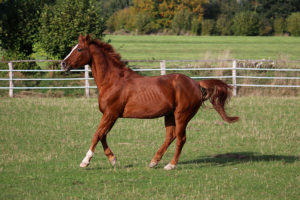Are Foals of Obese Mares At Risk for Musculoskeletal Issues?
Bigger isn’t always better—and that certainly appears to be the case for both broodmares and their foals. British researchers have confirmed that an overweight broodmare is more likely to give birth to a heavier foal, and that puts the foal at risk for health problems that could last a lifetime.
“Research has shown that heavier foals have an increased prevalence of conformational defects and nonseptic musculoskeletal disorders,” said Sarah Smith, MA, VetMB, MVetMed, Dipl. ACVIM, MRCVS, of Rossdales Equine Hospital, in Newmarket, U.K.
Smith and her fellow researchers examined 66 Thoroughbred broodmares’ body condition scores and evaluated blood work starting at 40 days of pregnancy. They found that the greater the mare’s body condition score—essentially, the more obese she was—the greater her foal’s birth weight.
That contradicts previous study results that have shown that higher body condition scores didn’t affect foal birth weight, Smith said. However, there was a significant difference in her study: The obese mares were already overweight when they got pregnant. In the previous studies, the mares were managed experimentally during the pregnancy to become obese. Scientific research has recently suggested that the metabolic status in early gestation can play an important role in “programming” the developing fetus, the researchers noted
Create a free account with TheHorse.com to view this content.
TheHorse.com is home to thousands of free articles about horse health care. In order to access some of our exclusive free content, you must be signed into TheHorse.com.
Start your free account today!
Already have an account?
and continue reading.

Related Articles
Stay on top of the most recent Horse Health news with


















